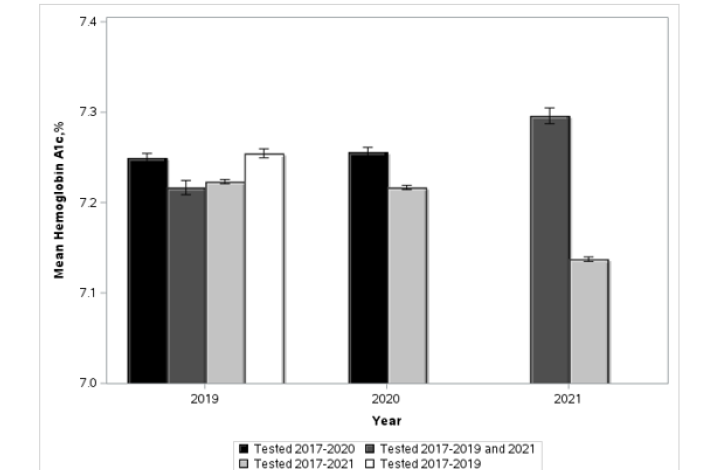Mini Review 
 Creative Commons, CC-BY
Creative Commons, CC-BY
Impact of Skipping Hemoglobin A1c Testing During Coronavirus Disease-2019 Pandemic
*Corresponding author: Harvey W. Kaufman MD, Quest Diagnostics, Secaucus, USA.
Received: March 20, 2023; Published: March 27, 2023
DOI: 10.34297/AJBSR.2023.18.002460
Summary
During the COVID-19 pandemic many patients skipped care. In this study of 2,411,751 patients in the United States, patients who skipped hemoglobin A1c testing in 2020 were adversely affected based on hemoglobin A1c values, compared to patients who did not skip testing in 2020.
Keywords: Hemoglobin A1c, Diabetes, COVID-19, Pandemic, Missed care
Objective
To assess the impact of skipping hemoglobin A1c (HbA1c) testing during the COVID-19 pandemic on glycemic control in patients with diabetes.
Method
We assessed HbA1c results for patients tested at Quest Diagnostics in each of 2017, 2018, and 2019 and subsequently in 2020 only, 2021 only, both 2020 and 2021, or neither 2020 nor 2021. To be included, patients had to have HbA1c result ≥ 6.5% in 2017 or an International Classification of Disease-10 code indicating type 1 or 2 diabetes. For patients with >1 test result in a calendar year, the mean value was used in the analyses. HbA1c results <4.0% or >14.0% were analyzed as at these limits. All HbA1c testing was within the limit for certification of methods by the National Glycohemoglobin Standardization Program of ±5.0% [1]. This Quest Diagnostics Health Trends study was deemed exempt by the wcg Institutional Review Board.
Results
The 2,411,751 patients in this study represented all 50 states and District of Columbia, 50.3% were female, and the mean (standard deviation) age was 63.3 (12.3) years. The majority of patients (1,404,773; 58.3%) had testing in 2017-2021; 374,959 (15.5%) were tested in 2017-2020; 178,280 (7.4%) were tested 2017-2019 and 2021 (but not 2020), and 453,739 (18.8%) were tested in 2017-2019 and neither 2020 nor 2021. The mean HbA1c value was relatively consistent among all groups in 2017, 2018, and 2019, with year-to-year shifts within acceptable assay tolerance. The differences in mean values between patients tested in 2017- 2020 (four consecutive years) and patients tested 2017-2021 (five consecutive years) were essentially flat throughout the study: 0.05% in 2017, 0.04% in 2018, 0.03% in 2019, and 0.04% in 2020 (Figure 1). In contrast, the difference in HbA1c values between patients tested in 2017-2019 and 2021 but not in 2020 and patients tested in each of the years 2017-2021 (five consecutive years) was 0.16% or approximately 10-fold higher in 2021 than the observed differences between these two groups in the prior years: 0.02% in 2017, -0.01% in 2018, and -0.01% in 2019.
Discussion
The majority (58.3%) of the 2.4 million patients received testing in all five consecutive years and only 7.4% appear to have skipped testing in 2020. The comparison between these groups suggests skipping testing in 2020 adversely impacted hemoglobin A1c levels. (Of note, 18.8% of patients tested 2017-2019 and not subsequently could have obtained testing elsewhere or skipped testing in 2020 and 2021.) Our study found that patients who missed testing in 2020 but were tested in 2021 had a small increase in mean HbA1c relative to 2019 values, while those tested in both 2020 and 2021 had a small decrease in 2021 relative to 2019. These findings suggest that patients who skipped care in 2020 and received testing in 2021 were adversely impacted.
During the early months of the pandemic, HbA1c testing declined dramatically (by two-thirds in March/April 2020 compared to prepandemic) [2]. A meta-analysis evaluating 27 studies from various countries found that lockdowns had no impact on HbA1c values among patients with diabetes [3]. In contrast, our study suggests that patients who skipped care in 2020 were adversely impacted. Returning to routine monitoring for those who have delayed or skipped healthcare is vital to monitor glycemic control in patients with diabetes.
Acknowledgmentsn
None.
Conflict of Interest
Kaufman Van, and McPhaul are employees of Quest Diagnostics and Kaufman and McPhaul own stock in Quest Diagnostics.
References
- Little RR, Rohlfing CL, Sacks DB (2011) National glycohemoglobin standardization program steering C. Status of hemoglobin A1c measurement and goals for improvement: from chaos to order for improving diabetes care. Clin Chem 57: 205-214
- Fragala MS, Kaufman HW, Meigs JB, Niles JK, McPhaul MJ (2021) Consequences of the COVID-19 Pandemic: Reduced Hemoglobin A1c Diabetes Monitoring. Popul Health Manag 24(1): 8-9.
- Silverii GA, Delli Poggi C, Dicembrini I, Monami M, Mannucci E (2021) Glucose control in diabetes during home confinement for the first pandemic wave of COVID-19: a meta-analysis of observational studies. Acta Diabetol. 58(12): 1603-1611.




 We use cookies to ensure you get the best experience on our website.
We use cookies to ensure you get the best experience on our website.